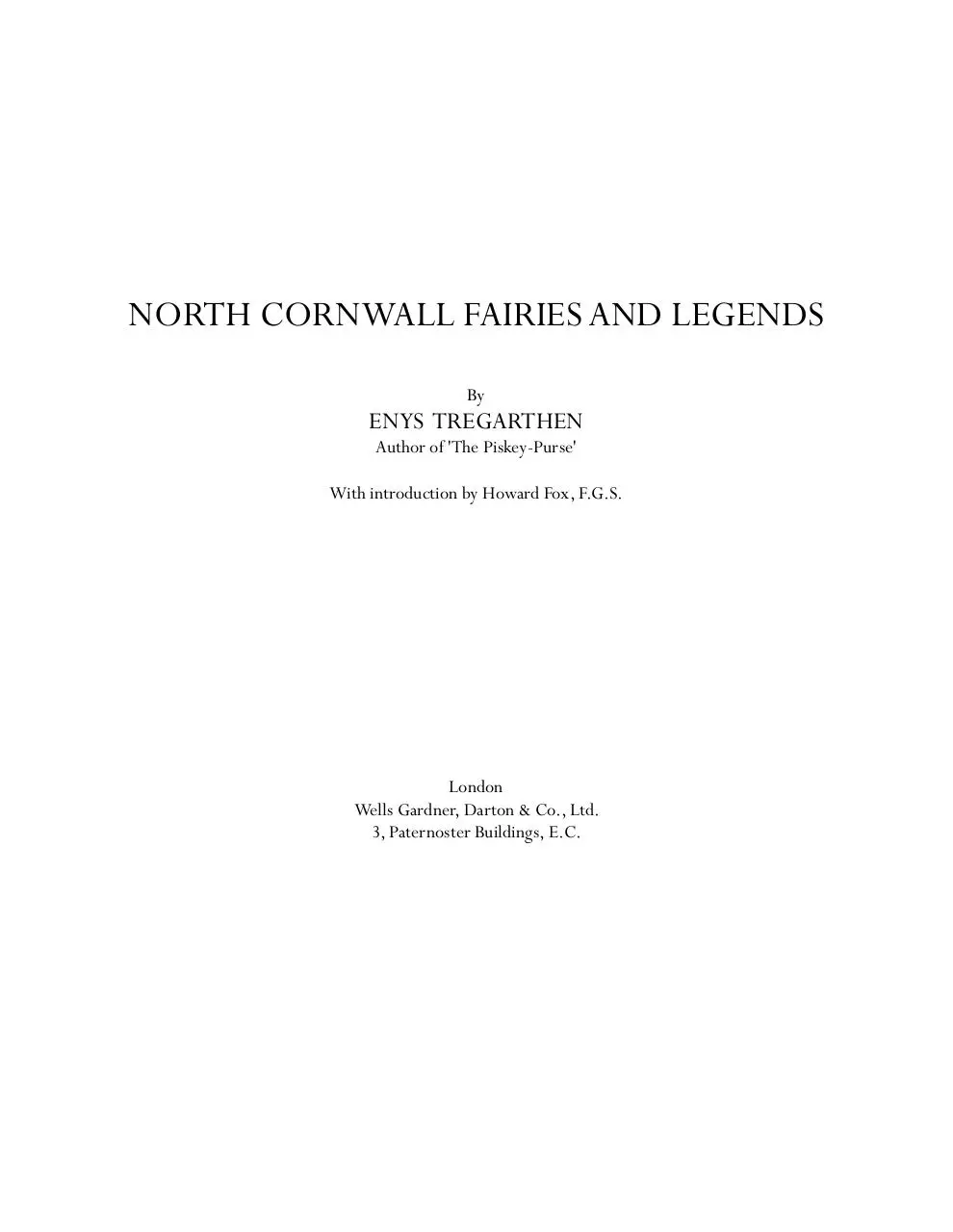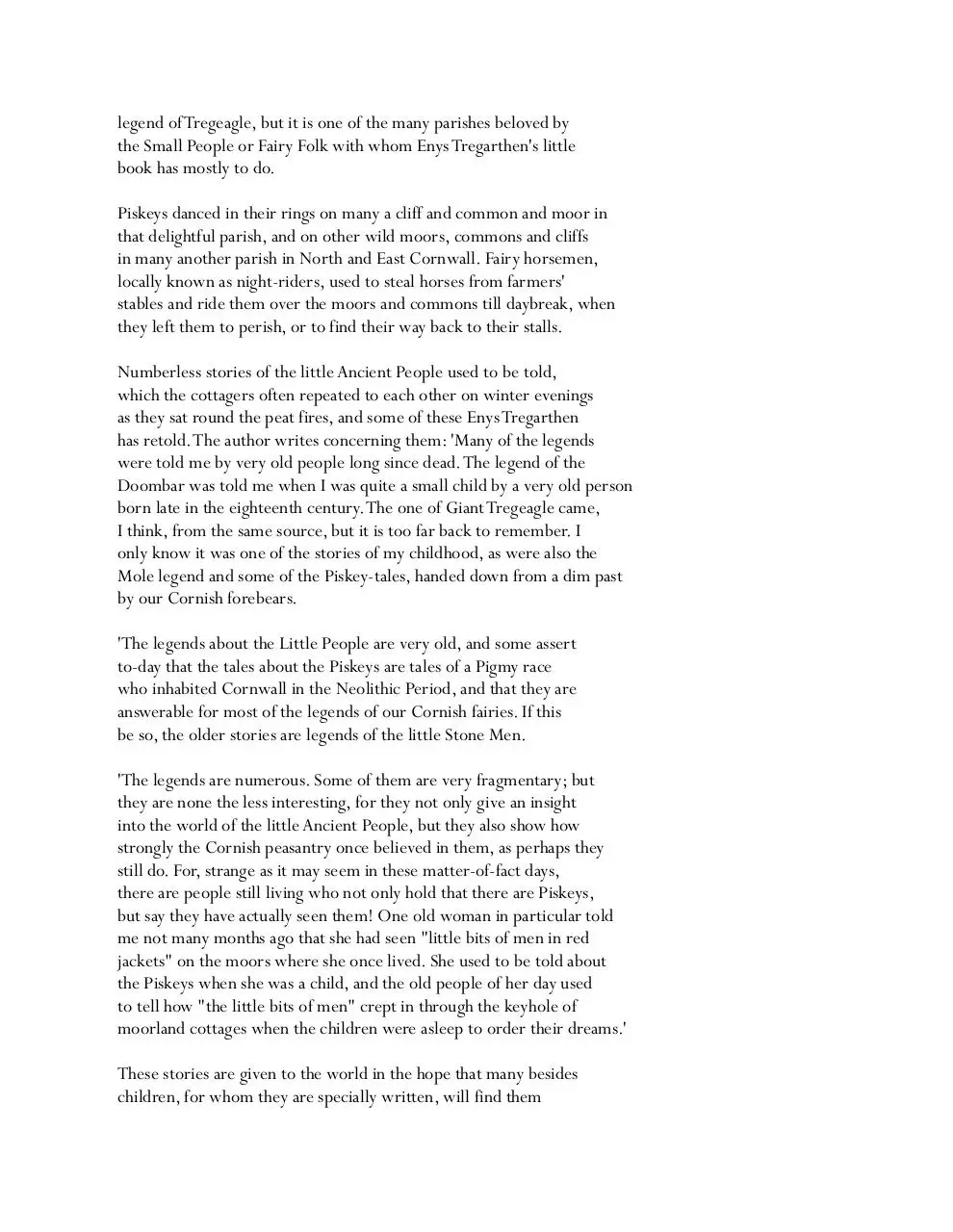North Cornwall Fairies and Legends (PDF)
File information
Title: North Cornwall Fairies and Legends copy
This PDF 1.3 document has been generated by TextEdit / Mac OS X 10.9.5 Quartz PDFContext, and has been sent on pdf-archive.com on 09/04/2015 at 00:10, from IP address 168.103.x.x.
The current document download page has been viewed 575 times.
File size: 324.66 KB (100 pages).
Privacy: public file





File preview
NORTH CORNWALL FAIRIES AND LEGENDS
By
ENYS TREGARTHEN
Author of 'The Piskey-Purse'
With introduction by Howard Fox, F.G.S.
London
Wells Gardner, Darton & Co., Ltd.
3, Paternoster Buildings, E.C.
CONTENTS
Page
Introduction
xi
The Adventures of a Piskey in Search of his Laugh
1
The Legend of the Padstow Doombar
51
The Little Cake-bird
71
The Impounded Crows
99
The Piskeys' Revenge
113
The Old Sky Woman
125
Reefy, Reefy Rum
131
The Little Horses and Horsemen of Padstow
139
How Jan Brewer was Piskey-laden
149
The Small People's Fair
159
The Piskeys who did Aunt Betsy's Work
165
The Piskeys Who carried their Beds
177
The Fairy Whirlwind
183
Notes
189
INTRODUCTION
The tales contained in this little volume of North Cornwall fairy
stories, by Enys Tregarthen, are either founded on folk-lore or they
are folk-lore pure and simple.
The scene of the first story is laid amid the ancient walls and
gateways of 'Grim Dundagel thron'd along the sea,' and other places
not quite so well known by those who live beyond the Cornish land,
but which, nevertheless, have a fascination of their own, especially
Dozmare Pool, where Tregeagle's unhappy spirit worked at his hopeless
task of emptying the pool with a crozan or limpet-shell 'that had a
hole in it.'
This large inland lake, one mile in circumference, is of unusual
interest, not only because of the Tregeagle legend that centres
round Dozmare, but from a tradition, which many believe, that it
was to this desolate moor, with its great tarn, that Sir Bedivere,
King Arthur's faithful knight, brought the wounded King after the
last great battle at Slaughter Bridge, on the banks of the Camel.
A wilder and more untamed spot could hardly be found even in Cornwall
than Dozmare Pool and the barren moors surrounding it. As one stands
by its dark waters, looking away towards the bare granite-crowned
hills and listening to the wind sighing among the reeds and rushes
and the coarse grass, one can realize to the full the weird legends
connected with it, and one can see in imagination the huge figure of
Tregeagle bending over the pool, dipping out the water with his poor
little limpet-shell.
The Tregeagle legends are still believed in. When people go out to
Dozmare Pool, they do not mention Tregeagle's name for fear that the
Giant will suddenly appear and chase them over the moors!
On the golden spaces of St. Minver sand-hills the legends about this
unearthly personage are not so easily realized, except on a dark
winter's night, when the wind rages fiercely over the dunes and one
hears a fearful sound, which the natives say is Tregeagle roaring
because the sand-ropes that he made to bind his trusses of sand are
all broken. St. Minver is not only known for its connection with the
legend of Tregeagle, but it is one of the many parishes beloved by
the Small People or Fairy Folk with whom Enys Tregarthen's little
book has mostly to do.
Piskeys danced in their rings on many a cliff and common and moor in
that delightful parish, and on other wild moors, commons and cliffs
in many another parish in North and East Cornwall. Fairy horsemen,
locally known as night-riders, used to steal horses from farmers'
stables and ride them over the moors and commons till daybreak, when
they left them to perish, or to find their way back to their stalls.
Numberless stories of the little Ancient People used to be told,
which the cottagers often repeated to each other on winter evenings
as they sat round the peat fires, and some of these Enys Tregarthen
has retold. The author writes concerning them: 'Many of the legends
were told me by very old people long since dead. The legend of the
Doombar was told me when I was quite a small child by a very old person
born late in the eighteenth century. The one of Giant Tregeagle came,
I think, from the same source, but it is too far back to remember. I
only know it was one of the stories of my childhood, as were also the
Mole legend and some of the Piskey-tales, handed down from a dim past
by our Cornish forebears.
'The legends about the Little People are very old, and some assert
to-day that the tales about the Piskeys are tales of a Pigmy race
who inhabited Cornwall in the Neolithic Period, and that they are
answerable for most of the legends of our Cornish fairies. If this
be so, the older stories are legends of the little Stone Men.
'The legends are numerous. Some of them are very fragmentary; but
they are none the less interesting, for they not only give an insight
into the world of the little Ancient People, but they also show how
strongly the Cornish peasantry once believed in them, as perhaps they
still do. For, strange as it may seem in these matter-of-fact days,
there are people still living who not only hold that there are Piskeys,
but say they have actually seen them! One old woman in particular told
me not many months ago that she had seen "little bits of men in red
jackets" on the moors where she once lived. She used to be told about
the Piskeys when she was a child, and the old people of her day used
to tell how "the little bits of men" crept in through the keyhole of
moorland cottages when the children were asleep to order their dreams.'
These stories are given to the world in the hope that many besides
children, for whom they are specially written, will find them
interesting, and all lovers of folk-lore will be grateful to know
that the iron horse and other modern inventions have not yet succeeded
in driving away the Small People, nor in banishing the weird legends
from our loved 'land of haunting charm.'
H. F.
THE ADVENTURES OF A PISKEY IN SEARCH OF HIS LAUGH
'... A soft
Cradle of old tales.'
W. B.Yeats.
The moon was shining softly down on the grey ruins of King Arthur's
Castle by the Tintagel sea, and on hundreds of little Piskeys dancing
in a great Piskey-ring on the mainland, known as Castle Gardens.
In the centre of the ring stood a Little Fiddler, fiddling away with
all his might, keeping time with his head and one tiny foot.
The faster he played and flung out the merry tune on the quiet moonlit
night, the faster the Piskeys danced. As they danced they almost
burst their sides with laughter, and their laughter and the music of
the Little Fiddler was distinctly heard by an old man and his wife,
who then lived in the cottage near the castle.
One little Piskey, somewhat taller than a clothes-peg, was the best
dancer there, and his laugh was the merriest. He was dancing with
a Piskey about his own size, who could hardly keep step with his
twinkling feet.
As the Piskeys careered round and round the Piskey-ring, the tiny
chap who was the best dancer, and had the merriest laugh, suddenly
stopped laughing, and his little dancing feet gave under him, and down
he went with a crash, dragging his little companion with him. Before
they could pick themselves up, the Piskeys who were coming on behind,
not seeing the two sprawling on the ring, fell on them, and in another
moment Little Fiddler Piskey saw a moving heap of green-coated little
bodies and a brown tangle of tiny hands and feet.
So amazed was he at such an unusual sight that he stopped fiddling,
and let his fiddle slip out of his hand unnoticed on the grass.
When the Little Men had picked themselves up, except the one who
had caused the mishap, they began to pitch into him for tumbling and
causing them to tumble, when something in his tiny face made them stop.
'What made you go down on your stumjacket like that when you were
dancing so beautifully?' asked a Piskey not unkindly.
'I don't know,' he answered, looking up at his little brother Piskey
with a strange expression in his face, which was pinched and drawn,
and pale as one of their own Piskey-stools; and instead of a laugh
in his dark little eyes there was misery and woe.
The strange expression in his eyes quite frightened the Piskeys,
and one said: 'What is the matter with you? You are looking worse
than a cat in a fit.'
'Am I?' said the poor little Piskey. 'I am feeling very queer. It was
a queerness that made me fall on my little stumjacket. Am I ill like
those great men and women creatures we sometimes entice into the bogs
with Piskey-lights?'
'We have never heard of a Piskey getting ill or sick,' said a little
brown Piskey, 'have we?' turning to speak to the Little Fiddler,
who had come over to his companions, bringing his fiddle with him.
'I most certainly haven't,' answered the Little Fiddler.
'Then what is the matter with me, if I'm not sick?' asked the little
Piskey who was looking so queer.
'Perhaps Granfer Piskey will be able to tell you, for I can't,'
said the Tiny Fiddler.
'Where is Granfer Piskey?' asked the poor little sufferer. 'I am
afraid I am getting worse, for all the dance has left my legs.'
'Granfer Piskey is over on the Island,' cried a little Piskey.
'So he is,' said all the other Piskeys, sending their glance in that
direction, where, on the edge of a beetling cliff facing Castle
Gardens, stood a tiny old man, with a white beard flowing down to
his bare little feet. He was dressed, as were all the other Piskeys,
in a bright green coat and a red stocking cap.
He disappeared into a Piskey-hole the Piskeys had dug in the cliff,
which led down into an underground passage between the Island and the
mainland, and very soon he reappeared from another hole in Castle
Gardens, a few feet from where the little Piskeys were anxiously
awaiting him.
'Why are you not fiddling, dancing and laughing?' asked the
little Whitebeard, winking his eyes on the silent little Piskey
crowd, standing near their little brother Piskey who was looking
so queer. 'You are wasting precious time standing here doing
nothing. Before a great while the moon will have set over Trevose,
and the time for merry-making and high-jinks will be over,' he added,
as not a Piskey spoke.
'We are not fiddling, dancing and laughing because of something that
has befallen our little brother,' said the Tiny Fiddler at last,
pointing to the poor little Piskey who had raised himself to a sitting
position and was seated on the Piskey-ring.
'He is a rum-looking little customer, sure 'nough,' said the old
Whitebeard, glancing in the direction of the place where the Little
Fiddler pointed. 'What is the matter with him?'
'That is what we want to know,' answered the Little Fiddler. 'Come and
have a closer look at him, Granfer Piskey;' and Granfer Piskey came.
'What is the matter with him?' asked one of the Piskeys when the
Whitebeard had stared down a minute or more on the little atom of
misery sitting humped up on the edge of the great green ring like
a toad on a hot shovel. 'You are so old and wise, you will be able
to tell us what ails him, if anybody can. He thinks he is sick like
the big people we lead a fine dance round the fields and commons
sometimes,' as Granfer Piskey stood stock-still before the little
afflicted Piskey, winking and blinking and solemnly shaking his head.
'He is not sick like those people of whom you spoke,' said the
Whitebeard at last. 'He has----'
'The make-outs,' shrilled a little voice with a laugh somewhere in
the background.
'No, he hasn't the make-outs, you impudent little rascal!' said
Granfer Piskey, without lifting his gaze from the poor little fellow
on the edge of the ring. 'That's a complaint from which you apparently
suffer.'
'What has he?' asked the Tiny Fiddler, impatiently scraping his
fiddle-stick over his fiddle, as if to emphasize his words.
'It isn't what he has, but what he hasn't,' said the old Whitebeard,
in the same slow, solemn voice. 'I was going to say that our poor
little brother has lost his laugh.'
'Lost his laugh!' cried little Fiddler Piskey and all the other little
Piskeys; and their tiny faces of consternation showed what a terrible
thing had befallen their poor little brother.
'Yes, he has had the sad misfortune to lose his laugh,' said the
little old Whitebeard, winking and blinking harder than ever as he
stood before the unhappy little Piskey who had lost his laugh; 'and,
worse still, he is quite done for till he finds it again.'
'Where has my laugh gone to, Granfer Piskey?' asked the miserable
little Piskey who had met with that dreadful misfortune.
'I don't know more than the Little Man in the moon,' answered the
tiny old Whitebeard; 'but if I were you I would go and look for it.'
'Where must I go and look for my laugh?' asked the poor little Piskey.
'I have not the smallest idea; but I should go and search for it till
I found it.'
'Will you come with me and search for my laugh?' asked the little
Download North Cornwall Fairies and Legends
North Cornwall Fairies and Legends .pdf (PDF, 324.66 KB)
Download PDF
Share this file on social networks
Link to this page
Permanent link
Use the permanent link to the download page to share your document on Facebook, Twitter, LinkedIn, or directly with a contact by e-Mail, Messenger, Whatsapp, Line..
Short link
Use the short link to share your document on Twitter or by text message (SMS)
HTML Code
Copy the following HTML code to share your document on a Website or Blog
QR Code to this page

This file has been shared publicly by a user of PDF Archive.
Document ID: 0000219943.